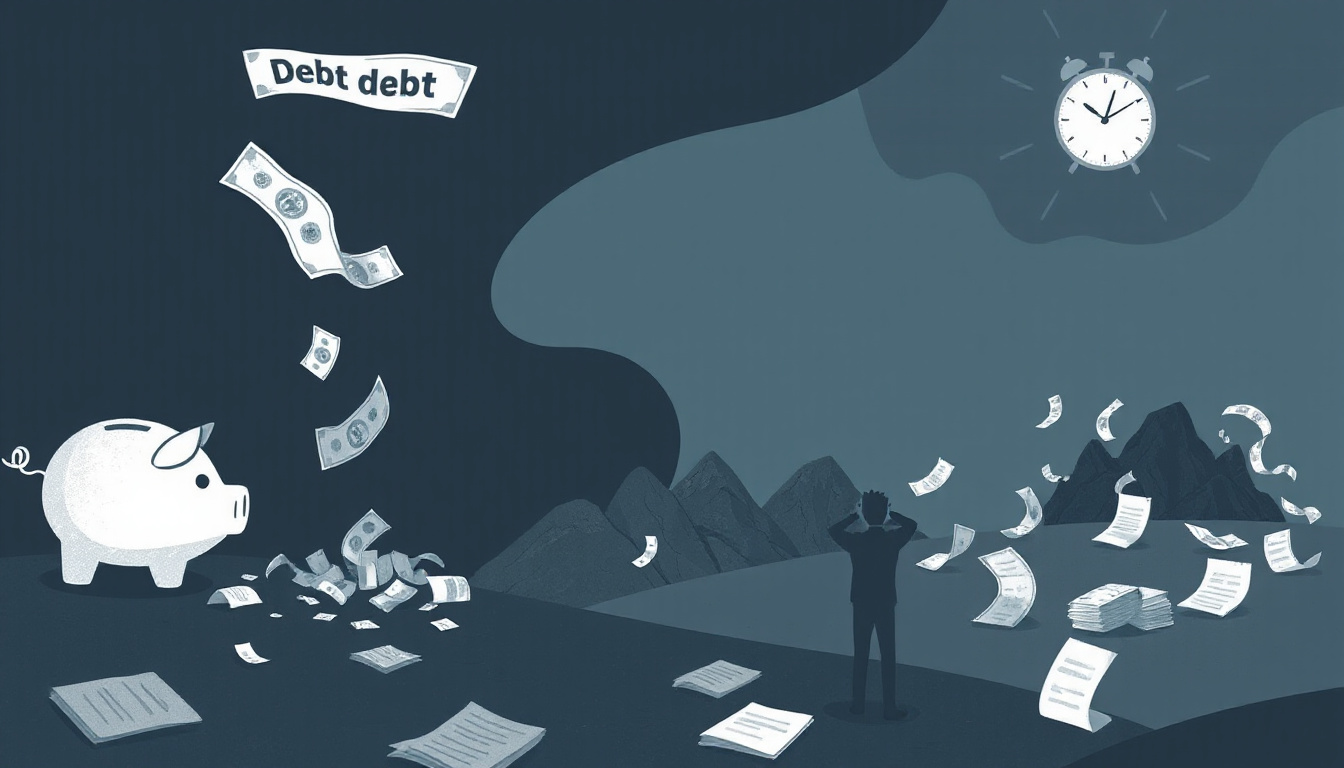Understanding your financial health is crucial in today’s rapidly changing economic environment. In Canada, many Canadians find themselves struggling with debt, often facing various warning signs that indicate their financial situation may be deteriorating. Recognizing these early warning signs is essential to regaining control and preventing potential financial troubles from escalating. This article will discuss the seven major warning signs of growing debt that you should be on the lookout for, as well as actionable solutions to help you manage your debt effectively. From the pitfalls of making only minimum payments to the mental health impacts of financial stress, we delve into each sign with detailed explanations and practical advice to help you navigate your way back to financial stability.

Key Takeaways
- Recognizing early warning signs of growing debt is crucial for preventing financial troubles.
- Making only minimum payments and maxing out credit cards are red flags indicating unsustainable debt levels.
- Ignoring financial issues can exacerbate stress and lead to serious emotional and health concerns.
Understanding the Warning Signs of Growing Debt
### Understanding the Warning Signs of Growing Debt
Recognizing the warning signs of growing debt is crucial in maintaining financial stability and ensuring that small issues do not escalate into overwhelming problems. Here are key indicators that may suggest your debt is becoming unmanageable:
1. Making Only Minimum Payments: If you find yourself consistently paying just the minimum on your credit cards, beware. This practice leads to accumulating interest at a staggering rate, extending repayment timelines significantly and inflating your total debt. To counteract this, consider tightening your budget or seeking financial advice to develop a structured repayment plan.
2. Maxed Out Credit Cards: Regularly reaching your credit limit indicates that your spending habits are exceeding your income. This not only jeopardizes your financial health but also contributes to a lower credit score. You may want to assess your expenses critically, eliminating non-essentials, and explore alternatives such as debt consolidation to manage your credit more effectively.
3. Requiring Credit for Everyday Expenses: Utilizing credit cards to cover necessary living costs like rent or groceries signals a significant financial strain. If this is your norm, it may be time to reassess your budget or seek help from a financial advisor who can guide you in creating a sustainable cash flow plan.
4. Falling Behind on Payments: If you are missing or making late payments, it’s a sign your debt management strategy is faltering. This not only incurs extra fees but can also severely damage your credit rating. Implementing reminders or automatic payments might help keep your finances on track, reducing the risk of late payments.
5. Avoiding Financial Accountability: If checking your bank accounts causes anxiety or you frequently ignore financial statements, it’s likely you’re in denial about your situation. Facing your finances head-on is the first step towards recovery. A financial coach or accountability partner can help ease this burden and provide motivation to take control.
6. Receiving Collection Calls or Legal Notices: Persistent contact from creditors is a serious indicator that your debt issues are worsening. If you are experiencing such communications, do not ignore them; early intervention is key. Consulting a Licensed Insolvency Trustee can provide options such as consumer proposals or debt management plans.
7. Impact on Mental Health: The stress of financial problems can lead to emotional strain and even health issues. If debt is taking a toll on your mental well-being, it’s vital to seek support not just for your finances, but also your mental health. Talking to professionals can help you regain control in both areas.
Timely recognition of these signs can empower Canadians to take the necessary steps to address their debt. This could include reaching out to a Licensed Insolvency Trustee for tailored debt management strategies like consumer proposals, debt consolidation, or bankruptcy. Taking action now can facilitate recovery and pave the way for better financial health in the future.
Taking Action: Solutions to Manage Debt
To effectively tackle growing debt, Canadians must be proactive and informed about potential solutions available to them. A crucial first step is consulting with a Licensed Insolvency Trustee (LIT). These professionals specialize in providing actionable advice tailored to your unique financial situation. One viable option is a consumer proposal, which allows individuals to settle their debts for less than what is owed while avoiding bankruptcy. This strategy is not only designed to simplify repayments but also to protect your assets. Additionally, debt consolidation can be an attractive solution, as it combines multiple debts into one manageable payment, often with a lower interest rate. This approach simplifies financial management and helps regain control over one’s finances. Furthermore, should circumstances deem it necessary, bankruptcy might serve as a last resort, providing a fresh start from overwhelming debt. No matter the route chosen, taking prompt action is essential; delaying can only lead to larger financial troubles exacerbated by increasing interest and late fees. Engaging in financial planning conversations will also empower Canadians to develop long-term strategies for financial health, focusing on budgeting, saving, and making informed spending choices.
